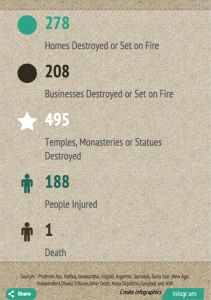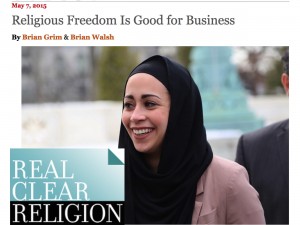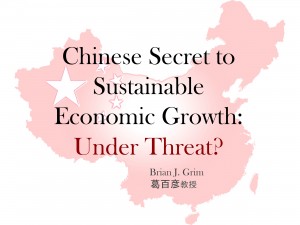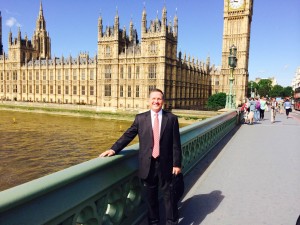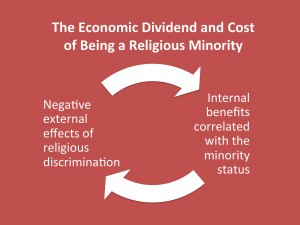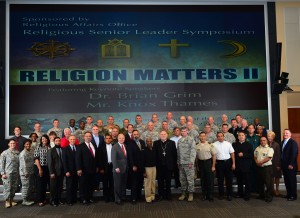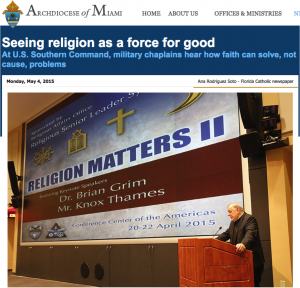 By +John Cardinal Onaiyekan, Catholic Archbishop of Abuja – Nigeria
By +John Cardinal Onaiyekan, Catholic Archbishop of Abuja – Nigeria
Prepared comments for the 3rd World Forum on Inter Cultural Dialogue, Baku – Azerbaijan, May 18-19, 2015. In addition to his duties in Nigeria, Cardinal John Onaiyekan is a member of the World Economic Forum’s Global Agenda Council on the Role of Faith.
This is the first in a series of articles where religious & business leaders speak out about countering violent extremism. For more on the Religious Freedom & Business Foundation’s work on countering radicalization, see the Empowerment+ Initiative.
Introduction
Violent Religious Extremism (VRE) has in recent times become a topic for frequent discussion at many inter-faith gatherings and conferences. Some of us in this panel have been encountering ourselves on such occasions across the continents. This is not surprising. Rather it has become necessary since VRE has become a matter of grave concern in our contemporary world to both civil authorities and religious communities and institutions. The exploits and atrocities of terrorists of all kinds of names on rampage in many parts of the world today, claiming to be acting in the name of God and for the promotion of a religion, are a major challenge to governments and an embarrassment to religious authorities. This came out very clearly in the recent, first of its kind, two-day event convened at the UN General Assembly at which high level spokespersons of the major world religions robbed minds with the country representatives of the nations of the world in the hall of the General Assembly. The entire proceedings were facilitated by the UN High Representative for the Alliance of Civilizations, and chaired by the incumbent President of the General Assembly and the Secretary General of the UN, both in person. It is good that we are now not only taking this matter seriously but also acknowledging that there is need to bring many stakeholders, including and especially religious authorities, to reflect and act together on this matter that is of concern to us all.
We must commend and congratulate the government of Azerbaijan for its commitment organizing forums like this one here in what has become known as the “Baku Process”. Some people may say that there are too many meetings, with talking and no effective action. But meeting and talking is by means a waste of time – or money! Talking and reflecting together leads to a change of attitude. This leads to a change of behaviour, which in turn leads finally to a change in the world. We cannot be tired until there is peace and harmony in our world.
Non-violent Religious Extremism
Permit me to start my contribution here with a point I raised already in the UN event mentioned above. VRE has its origin and context in an environment of widespread generally accepted non-violent religious extremism. Where religious intolerance holds sway with a rejection of the other, the ground is fertile for the emergence of VRE, even without carrying guns and bombs. Christianity and Islam are particularly susceptible to this kind of intolerance because of the sometimes mutually exclusive absolute doctrinal claims of each of them. In our contemporary world, characterized by an ever increasing globalization and pluralism of faiths, the challenge is on us all to find ways to reconcile our absolute claims with acknowledging the right of others to their own absolute claims, in a spirit of mutual respect and freedom. Religious leaders can no longer abdicate their responsibility to review their doctrines and dogmas along these lines, and pass this down the line to the local teachers and preachers, and ultimately to the general adherents at the grass roots. The good news is that the people at the grassroots are often not the problem. I am proud to claim that my Church, the Catholic Church has been working along these lines for the past 50 years following the Second Vatican Council. Pope Paul VI, in the 60s, laid down the principles to guide this process, that while the essence of the content of the Catholic faith remains ever true and unchangeable, the way it is expressed and presented, both in words and ritual gestures, can change, and has always changed, with the times. Other religious communities have to embrace his task, according to their own principles and traditions. There can be no peaceful living together in our contemporary world unless we find a way, not only to tolerate, but also to respect and accept one another. The era of every nation with its religion is over and gone. This calls for new attitudes and rules for living together in peace and harmony. We note that this is not only not impossible, but that it is already happening in many parts of the world. A good example is the revision of school religious text books and catechisms to give children a positive orientation in this regard from early childhood.
Charity Begins at Home
If our world is to move effectively towards a new era of respect for legitimate pluralism and the right to be different on the basis of a free conscience, then “charity must begin at home”.
Religious communities have to get used to differences within their respective religious families. The Christian community has accepted this reality for many centuries. The times when heretics had no right to exist, and had only the choice between falling in line with rigid orthodoxy or get roasted at the stake are long gone. The aim of the world ecumenical movement has been to maintain some measure of mutual respect in one faith family despite our differences of doctrines and church institutions. Islam and other world religions cannot delay indefinitely this kind of process.
More significant and urgent is the national dimension of this discussion. Every nation will need to readjust its laws and institutions in such a way that citizens can enjoy equal rights as citizens, irrespective of their religious affiliation. This is the situation in most countries of the world. But there are a few significant exceptions, where a particular religion is considered by law as the official religion of the state, where as a result, the adherents of other faiths are allowed at most the status of second class citizens. A nation which does not respect religious pluralism within its own borders can hardly sincerely and effectively demand it on a global level. The time has come to go beyond political politeness and diplomatic niceties, and call a spade a spade wherever religious freedom is denied or restricted for whatever reason or excuse.
Religious leaders should be in the front line of the defence of freedom of religion, not only for their own adherents, but for all others too. This is particularly necessary where persons belonging to a religious minority suffer discrimination. For example, Christian religious leaders in a predominant Christian country should spear-head action in defence of Muslim minority rights, just as Muslim religious leaders in a predominant Muslim country have a duty to defend the religious rights of the Christian minority. This is what will bring about peace and harmony among religious communities, and in the society at large.
Response to Religious Provocation: Scope and Limits
The recent tragic event connected with the attack on Charlie Hebdo publication in Paris has brought to world attention the delicate question of the scope and limits of response to religious provocation. We must continue to insist on the need to respect our respective sensitivities as regards what we all hold sacred. In particular, religious leaders must give leadership in refraining from insulting or ridiculing the religion of other people. We should be able to freely propagate our own religion without condemning others.
But when our religion is insulted, is there no limit to our response to such provocation? This is the issue raised by the Paris tragedy. Freedom of religion includes the freedom not to have any religion. Can we tolerate the annoying expressions of those who do not share our own sense of the sacred? The extreme case is where laws prescribe a death sentence for alleged “blasphemy”. There surely must be a better and more humane way to show our honour and respect to God. It is all the more reprehensible when generalized violence, including killing of people and destruction of places of worship are unleashed on communities far away from the scene of the provocation. We saw this in Nigeria after the Swedish cartoons and in the Niger Republic after the Charlie Hebdo incident. These are the things that give bad name to religion.
Heavy Negative Historical Baggage
We have to acknowledge that we are carrying a heavy historical baggage of intolerance and mutual suspicion. VRE has a long history. Still fresh in many minds are the stories of the Jihads and Crusades, traditionally told in glorious and heroic terms. We have to retell these stories of horrendous violence and destruction in a way that we may learn not to repeat the mistake of the past. I am aware that significant efforts have been made along these lines in many Christian circles. I will be glad to be informed of similar efforts in Muslim circles.
We cannot forget the dark history of many wars fought presumably in the name of God, in the promotion of one religion or the other. Today, religious leaders all over the world must adopt a zero tolerance attitude to inflicting violence on people for reasons of their religious opinions. We all need to agree that “religion is proposed, never to be imposed”. Our recent Popes have often insisted that to kill people in the name of God is a great blasphemy, and an insult against the Almighty God and Creator of every human person. It is in any case futile to impose religion by force. One may enforce compliance but never conviction.
Freedom of religion and of conscience, after the right to life, is the most important of all human rights. Our contemporary world that speaks so much of human rights must not close its eyes to the violation of this particular human right wherever it is denied or restricted. Those who are struggling for their rights in this regard deserve the support of all, especially when they are using non-violent means. This has been the heroic story of true martyrs all through the ages who have endured sufferings, deprivations and even death, rather than deny their faith.
Misuse of Religion
In many instances, religion has been co-opted into battles for other agenda of violence. Here we have cases of the abuse and misuse of religion. Religious leaders need to consistently liberate religion from such misuse, despite the patronages of political and social forces. There is a great challenge here for religious leaders in places with long tradition of close ties and cooperation, or sometimes even collusion, between religious and civil authorities. How can religious institutions positively cooperate with civil authorities for the greater good of the people, while retaining the freedom to give spiritual guidance to politicians and others who wield power? This is an ever pressing challenge.
Promoting Spiritual Values
The genuine role of religious leaders in the state is to positively promote spiritual values and virtues like justice, honesty, solidarity, modesty, care of the weak and the poor and similar concerns. These are areas where they can legitimately cooperate with civil authorities, in the service of the people. These are also fertile grounds for interfaith cooperation.
Seeking Common Grounds
If interfaith cooperation is to take place, religious leaders must constantly seek and discover the common grounds that they share in terms of religious convictions, moral principles and spiritual values. It is on the basis of such shared values that common action can effectively be undertaken. The attention of the international community is now being focussed on sustainable development. Religious leaders must join in and be admitted into the definition of the concrete content of this grand idea. They also have a major role in bringing the ideas to the awareness of the people at the grassroots whom they teach and preach to in their places of worship. Here again, their contribution will be all the more effective if carried out in interfaith cooperation. Areas of special concern for them would be the moral dimensions of projects envisaged and the importance of peace based on justice, on the local and global levels.
Conclusion
There are many people in our world today who refuse to see anything good in religion. They claim that it has been responsible for a lot of problems and evils in our world all through history. They therefore claim that the world would be much better off without religion. Unfortunately, there have been many instances when religion has been perceived as the cause of many wars and conflicts, both in history and even today. There are many self-proclaimed people of religion who have given religion a bad name.
But the same history has shown that the rejection of religion from human affairs has hardly ever created a paradise on earth. Furthermore, scientific evidence has shown that even today, more than 85% of the human race claims that they are guided by some form of religious conviction. It is therefore quite futile to ignore religion in human affairs.
The challenge is for this silent majority to rise up and save religion from the bad image that the few extremists are giving to it. This challenge falls especially, but not only, on the religious leaders. All stakeholders must join hands to put religion in a position to make its very valid contribution to the well-being of humanity. In fact, those who care to look at things objectively have confirmed the valid role which religious communities have been playing in the lives of the peoples of the world. Where there are no undue restrictions, religious communities and their leaders have proved their ability to reach down to the most needy and neglected. Here, Christianity and Islam must take a major responsibility, since they are the religions with the widest following. It is certainly the will of God the Creator of all humanity that we live in peace with one another in a safe, peaceful and harmonious world. We must all be part of the project to achieve this.
I want to end with an observation in form of a concluding appendix. In this forum and in some other similar ones that I have participated in, the discussion is often presented in form of relationship between “Islam and the West”. To me, this formulation is inaccurate, misleading and unhelpful. I ask myself where I come into this picture, since I am neither Muslim nor Western. Comparing Islam with the west is like comparing oranges with apples. Islam goes well beyond the Middle East and Arab lands, and what we now call “the West” has lost or abandoned much of its traditional Christian character. If we are to make progress in these matters, we would need to clarify better these overlapping and often conflicting identities. Those of us who do not fall within the parameters of “Islam and the West” have our own story too. This could provide some valid lessons for the rest of the world. But is anyone listening to us?


